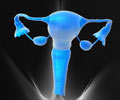
Only around one-third of IVF cycles achieve a pregnancy, and unsuccessful attempts (implantation failure) can usually be explained by embryonic or uterine factors. As a result, outpatient hysteroscopy is performed routinely in many fertility clinics before further attempts, first diagnostically to visualise the surface of the uterus and check for any abnormal growths, and then operatively during the same procedure to remove these growths. Several studies have suggested that this can be beneficial prior to further IVF.
However, the TROPHY study has now found such benefit to be less than previously suggested.
This was a large randomised trial performed in eight IVF centres in Europe between 2010 and 2013. More than 700 women were randomised to IVF with hysteroscopy (in the preceding cycle), or IVF without; all were under the age of 38, without known uterine pathology, and had history of unsuccessful IVF (two to four failed cycles).
First, results showed that some abnormality of the uterine cavity was found in 11% of the patients having hysteroscopy.
Second, outcome results following IVF showed no significant difference between the two groups - a live birth rate per patient of 31% in the hysteroscopy group and 29% in the control group.
Advertisement
However, if the gold standard of a randomised trial has now failed to show any significant benefit of outpatient hysteroscopy before IVF, where might the source of any benefit lie? "It is possible that endometrial scratching rather than routine outpatient hysteroscopy could be responsible for the previously reported improvements," said Dr El-Toukhy, referring to a procedure which too has raised controversy in recent years. Several studies - and study reviews - have shown that "injury" to the surface of the uterus (endometrium), which includes scratching, biopsy or even hysteroscopy, may improve implantation following embryo transfer in IVF.
Advertisement
Commenting on the impact of hysteroscopy in women with recurrent implantation failure in IVF, Dr El-Toukhy explained that in this study it was mainly applied diagnostically - although "when an abnormality was found and deemed treatable by the surgeon, it was treated either at the same hysteroscopy or at a latter date under anaesthetic". In view of the neutral results of the study it seems possible that some of the abnormalities found "had little clinical significance" - although the study was not designed to test this.
Meanwhile, infertile women with recurrent IVF failure in IVF remain a challenging treatment group, with still little consensus on how they might best be treated.
Source-Eurekalert













